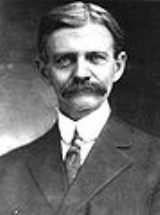
Thomas R. Marshall
Governor of Indiana, Vice President of the United States, and noted lecturer.
Chapter V
- Money will accomplish much in business, love and war but it isn't worth a cent in nature. You could plant all the doubloons lost in the Spanish Main on a New England farm and you would not raise a single ear of corn the more therefor. You could take the golden eagles of America and put them in the alfalfa fields of Indiana and you would not get a single blade more of grass. The moral is that nature has her own way of fixing valuation; and her valuation is the way of return made from the soil. She does not care the least what men may say, by way of trade and barter, that she is worth. Her worth in her own scales consists in her ability to produce something that will minister to the needs, the comforts and even to the luxuries of her children.
Chapter VI
- No, there is no world-wide standard for the determination of provincialism. There is only one standard by which to judge men and women, and that standard is not so much one of brains and education as it is of culture and heart. Kindness seems to be the one golden metewand by which to measure how really civilized and catholic one may be.
- There was not one of my blood, in or out of the Union Army who was not either serving and sacrificing at home or suffering and dying among the hills and valleys of the southland for the preservation of the Union. And yet, so bitter was the politics of the time that they had to undergo the suspicion of being disloyal to their country because they did not vote the Republican ticket. My grandfather and my father were notified by the Methodist preacher whose church they attended that he would have to strike their names off the roll if they continued to vote the Democratic ticket. My grandfather, as a fiery Virginian, announced that he was willing to take his chance on Hell but never on the Republican party.
Chapter XIV
- The labor unions of Indiana proceeded to meet and resolve. They resolved in such violent and vicious language that no partisan press could be found willing to print the resolutions. Long afterward I learned that I was shadowed for six months by Secret Service men in the fear that I might be assaulted by some over-zealous union man. Of this I was not aware at the time, or I should have taken steps to have prevented it. Whether I am a Presbyterian or a fatalist I do not know, but I do know that if I am to be shot, I will never be hanged.
- In the city of Denver, while I was vice-president, a big husky policeman kept following me around until I asked him what he was doing. He said he was guarding my person. I said: "Your labor is in vain. Nobody was ever crazy enough to shoot at a vice-president. If you will go away and find somebody to shoot at me, I'll go down in history as the first vice-president who ever attracted enough attention even to have a crank shoot at him."
Chapter XVI
- I make no pretense to accuracy. I shall be quite content if the sensibilities of no one are wounded by anything I may reduce to type.
Chapter XVII
- The Vice-President's Chamber is adjacent to the Senate Chamber, and so small that to survive it is necessary to keep the door open in order to obtain the necessary cubic feet of air. When the vice-president is in the room [the Capitol Guides] go by with their guests, stop and point him out, as though he were a curiousity.
I stood this for about as long as I could, and then went to the door one day, and said: "If you look on me as a wild animal, be kind enough to throw peanuts at me; but if you are really desirous of seeing me, come in and shake hands." In that way I think I restored myself to the position I have always desired to occupy; that of an American, who looks up to nobody, looks down upon nobody, but tries to keep a conscience clean enough that he can look everybody in the face.
Chapter XXI
- As in his public affairs, so in his private life the American rarely prepares himself for the future. He is wholly unwilling to have anything transmitted to him by water that he can get by rail. It irks him to wait the slow process of freighting when there is an express car coming to his town, and if somebody will soon discover how to deliver by aeroplane, that is the way he will obtain what he wants. He never wants it until he wants it, and when he wants it, he wants it at once. The farmer does not look over his machinery in the winter time to ascertain what it needs in the way of repair; but waits until a week or ten days before he needs it and then telegraphs for the repair parts to be sent by express.
Attributed
- Bristow hasn't hit it yet. What this country needs is a good five-cent cigar.
--reported comment made to a Senate clerk while Senator Joseph Bristow of Kansas was making a speech in which he repeatedly used the phrase, "What this country needs...." Although Marshall may have spoken the words, they originated with newspaper cartoonist Kin Hubbard who had his "Abe Martin" character say them. 1
Quotes from others about Thomas R. Marshall
- An unfriendly fairy godmother presented him with a keen sense of humor. Nothing is more fatal in politics.
--Colonel Edward M. House, adviser to President Woodrow Wilson.2
